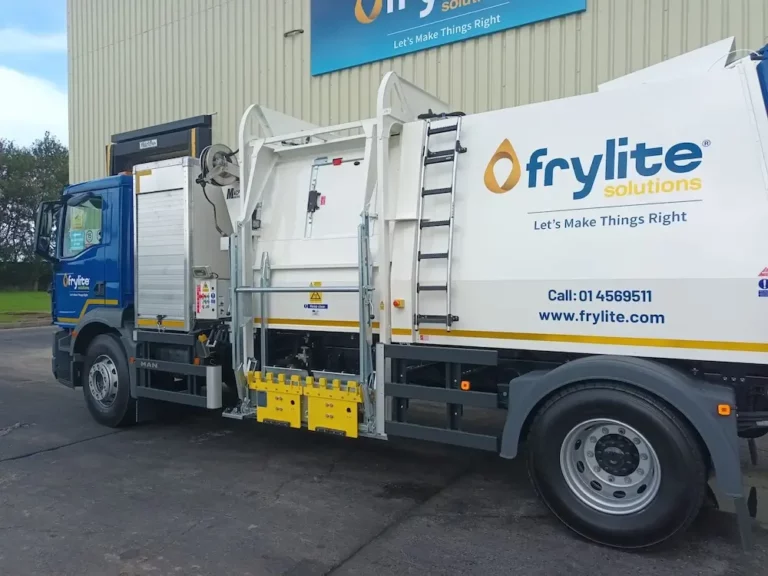Why Does Food Waste Matter? The Importance of Reducing Food Waste
In our rapidly changing world, the issue of food waste has emerged as a critical environmental, economic and social challenge. Each year, more than a billion tonnes of food intended for human consumption never reaches a plate. This vast amount of waste not only reflects inefficiencies in our global food systems but also highlights opportunities for substantial improvement.
As a leader in sustainable food waste management, Frylite Solutions is committed to addressing these challenges head-on. By implementing innovative collection and recycling services, Frylite Solutions not only helps restaurants, catering companies and food processors across Ireland reduce their environmental impact but also supports them in strengthening their operations economically and socially. This article explores why reducing food waste is imperative and the role that Frylite Solutions plays in this essential sustainability effort.
The Scale of Food Waste Globally and in Ireland
Food waste is a pervasive issue with deep impacts across the globe. Annually, approximately 1.3 billion tonnes of food are wasted worldwide, according to the United Nations Food and Agriculture Organization. This staggering amount represents about one-third of all food produced for human consumption. In developed countries, much of this waste comes from consumers buying too much and disposing of food that is still good to eat.
Turning our attention to Ireland, the situation mirrors this global challenge. Research indicates that Irish households throw away roughly 250,000 tonnes of food each year, which costs an average household about €700 annually in lost groceries. This is complemented by the broader food service industry, where waste typically stems from inefficient practices in handling and storing food, as well as over-preparing.
This food waste in Ireland also contributes significantly to environmental degradation. When food waste is disposed of in landfills, it decomposes anaerobically, producing methane, a greenhouse gas far more potent than carbon dioxide. This issue extends beyond waste. It’s a cycle of excessive resource consumption including water, land, and energy, followed by impactful environmental release.
At the retail level, the statistics are similarly concerning. Supermarkets and food retailers contribute an additional estimated 85,000 tonnes of food waste per year in Ireland. This figure truly demonstrates the need for comprehensive waste management strategies that span the entire supply chain, from farm to table.
The effects of this wastage are not only felt in the loss of economic value but in the missed opportunity to improve food security for the most vulnerable. As Frylite Solutions steps in to help manage these inefficiencies, there is a clear pathway not only to reducing environmental impact but also to forging more sustainable, cost-effective practices that benefit businesses and consumers alike.
Environmental Impact of Food Waste
The environmental repercussions of food waste are extensive and multifaceted. When food is discarded, it’s not just the product itself that is wasted, but all the resources that went into producing, processing, transporting, and storing it. This includes massive amounts of water, energy, and labour, which all contribute to increased carbon footprints.
Globally, food production uses about 70% of fresh water supplies, and around 30% of global energy consumption goes into the food sector. Wasting food thus implies squandering these critical resources, exacerbating shortages in regions already vulnerable to scarcity. Not to mention, about 10% of global greenhouse gas emissions are linked to food that is not consumed, making food waste a significant contributor to climate change.
In terms of land use, nearly 30% of the world’s agricultural land area is used to produce food that is never eaten. This not only results in a loss of land productivity but also leads to deforestation, loss of biodiversity, and the destruction of natural habitats, which could have been avoided if food wastage was minimised.

When food waste ends up in landfills, it decomposes anaerobically to produce methane, a greenhouse gas that is up to 34 times more potent than carbon dioxide over a 100-year period. The methane emissions from landfills are so significant that they are considered one of the top sources of greenhouse gases worldwide, directly contributing to global warming and extreme weather patterns.
In Ireland, where significant quantities of food are discarded, the potential for reducing these environmental impacts is enormous. Through initiatives like those undertaken by Frylite Solutions, which focuses on sustainable food waste collection and repurposing strategies, the food service industry can dramatically decrease its environmental footprint. Frylite Solutions’ comprehensive approach helps ensure that food waste is either composted or used to generate biogas, turning a problematic waste product into a source of renewable energy and returning nutrients to the soil.
Economic Effects of Food Waste
The economic implications of food waste are staggering and resonate through every level of the economy. Annually, it is estimated that global food waste costs the economy approximately $940 billion. In Ireland, the financial losses linked to food waste are similarly profound, with the food service sector alone discarding hundreds of thousands of tonnes of food each year, equating to potential losses in the millions of euros.
This economic drain begins with the costs of growing, harvesting, transporting, and selling food that ultimately never reaches the consumer. For businesses, especially in the food service industry, inefficiencies that lead to waste also inflate operational costs. These costs manifest in over-purchasing, mismanaged inventory, and increased disposal fees, which all erode profit margins.
Local governments also bear substantial costs in managing food waste disposal. This includes the operation of landfill sites and waste management systems, which are funded by taxpayer money. Effective reduction and recycling of food waste can alleviate some of these public financial burdens by reducing the volume of waste that requires processing and extending the lifespan of landfills.
In addition to direct costs, there are also lost opportunities for economic growth through alternative uses of resources. Redirected, these could foster innovations in food production, renewable energy from biowaste, and the creation of new jobs in emerging green sectors. By integrating sustainable practices like those provided by Frylite Solutions, businesses not only reduce their environmental impact but also improve their profitability and operational efficiency.
Social Effects of Food Waste
Socially, the consequences of food waste are equally critical and often reflect broader issues of disparity and inefficiency within food systems. In Ireland, as in many parts of the world, significant amounts of food are discarded even as some populations face food insecurity and limited access to nutritious meals.
The irony of food waste is most starkly evident in the context of global hunger. Over 690 million people worldwide suffer from chronic undernourishment, yet the food wasted globally each year could feed billions. This stark contrast highlights a grave social injustice that food waste exacerbates.
Food waste also has cultural implications as it often stems from and reinforces consumer behaviours tied to food perceptions and buying habits. Oversized portions, aesthetic standards for produce, and “sell by” versus “use by” date confusions all contribute to unnecessary food discards. Education and awareness campaigns are crucial in shifting these perceptions and reducing waste.
Community-level impacts are profound as well. Local charities and food banks constantly struggle with resource limitations. Redirecting even a portion of food waste to these organisations could significantly bolster their efforts, providing relief to those in need while fostering a sense of community and mutual aid.
How Reduced Food Waste Benefits Restaurants, Catering Companies & Food Processors
Reducing food waste presents numerous advantages for businesses in the food service sector, which go far beyond mere compliance with environmental regulations. These benefits can significantly enhance the operational efficiency, profitability, and public image of a dining establishment.
One of the most immediate benefits of reducing food waste is the reduction in costs. Food service businesses typically operate on thin profit margins, and every saved euro counts. Efficient food use means buying less, which directly translates to lower operating expenses. Plus, minimising waste can also reduce disposal costs, which are not insignificant given the fees associated with waste management services. A study by the Waste and Resources Action Programme (WRAP) found that every €1 invested in food waste reduction could return €7 in savings, underscoring the economic incentive.
As consumers become increasingly aware of environmental issues, they are more likely to patronise businesses that demonstrate a commitment to sustainability. By actively reducing food waste, restaurants, catering companies and food processors not only contribute to environmental conservation efforts but also enhance their brand image. This can be a significant competitive edge in a crowded market, attracting customers who value ethical and environmental responsibility.
On a similar note, food service establishments that are seen as environmentally friendly and responsible often enjoy higher customer loyalty. The modern diner appreciates transparency and efforts made towards sustainability, including waste reduction. Marketing these efforts can therefore help in retaining existing customers and attracting new ones who are motivated by ecological considerations.
Implementing practices to reduce food waste forces a business to re-evaluate and optimise its operations. This might involve improving stock management, enhancing menu planning, or adopting more efficient cooking techniques—all of which can lead to a more smoothly run kitchen. Better operational practices not only reduce waste but can also improve the overall quality of service, which benefits the customer experience.
Finally, with increasing legal requirements around waste management, establishments that proactively reduce food waste can avoid potential fines and may benefit from incentives offered by governments for green practices. In many regions, including parts of Europe, regulations around waste disposal are tightening, and demonstrating proactive measures can place a business favourably in regulatory reviews.
Frylite Solutions assists food service and processing businesses in utilising these benefits through its dedicated food waste collection and management services. By partnering with Frylite Solutions, restaurants can ensure their waste is handled responsibly—converted into compost or biogas rather than contributing to landfill methane emissions. This partnership not only aids in regulatory compliance but also bolsters a businesses’ reputation as a sustainable and environmentally conscious establishment.

Addressing Food Waste With Frylite Solutions
Frylite Solutions’ approach to managing food waste from the hospitality and food processing sectors involves a comprehensive collection service that ensures food waste is recycled or repurposed sustainably. By integrating Frylite Solutions’ services, food service and processing establishments can significantly reduce their environmental footprint, contribute to the circular economy, and demonstrate leadership in sustainability. We encourage all businesses to reevaluate their waste management practices and engage with us to create a greener future. Together, we can make a significant impact in the fight against food waste.
STRABANE
- Orchard Rd Ind Estate, Strabane BT829FR
- +44 28 71 383133
- in**@fr*****.com
LISBURN
- 6 Ferguson Dr, Lisburn BT28 2EX
- +44 28 71 383133
- in**@fr*****.com
DUBLIN
- St. Annes, Cloughran, Swords
- +353 (0) 14569511
- in**@fr*****.com
GALWAY
- Kilcolgan, County Galway
- +353 (0) 91776752
- in**@fr*****.com
CORK
- Unit 1, GB Business Park, Little Island
- +353 (0) 214232392
- in**@fr*****.com
We supply a range of quality cooking oils straight to your door at prices that make sense.
Our reliable service collects waste cooking oil, making us the natural choice for complete vegetable oil solutions.
Everything we collect from the food industry is converted into renewable energy.
